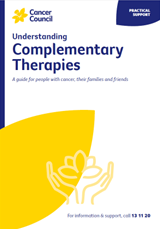- Home
- About Cancer
- Living well
- Complementary therapies
- Safety concerns
- Safety of herbs
Safety of herbs
All herbs should be prescribed by a qualified therapist. Although herbs are natural, they are not always safe. Taking the wrong dose or combination, or using the wrong part of the plant, may cause side effects or be poisonous (toxic). Serious side effects include damage to the liver or kidneys.
Some Ayurvedic and Chinese products have been shown to contain lead, mercury and arsenic in high enough quantities to be considered toxic. Other herbal preparations have been found to contain pesticides and prescription medicines.
Learn more about:
Using herbal products safely
There are things you can do to use herbal products safely:
- Buy herbal products from a qualified therapist or reputable supplier.
- If your therapist is making up a preparation for you, ask for it to be clearly labelled in English with your name, date, quantity, ingredients, dosage, directions, safety information (if applicable) and your therapist’s contact details.
- Avoid buying over-the-counter products online. Products from other countries that are available over the internet are not covered by the same quality and safety regulations as those sold in Australia, and may not include the ingredients listed on the label.
- Make sure you know how to prepare and take your herbs. Like conventional medicine, taking the correct dose at the right time is important for the safe use of herbal remedies.
- Check the label for any warnings about side effects and drug interactions. Talk to your doctor and complementary therapist about possible side effects and what you should do if you experience them.
- Report any suspected adverse reactions to any kind of medicine to your therapist or doctor. If the reaction is serious, call Triple Zero (000) or go to your nearest emergency department.
Using herbs and supplements during treatment
Some common herbs and supplements have been shown to cause harmful interactions with cancer treatments, including surgery, radiation therapy and chemotherapy. Talk to your surgeon or oncologist about whether you need to stop taking any herbs or supplements before treatment.
| St John’s wort | This popular herb for mild to moderate depression has been shown to stop some chemotherapy drugs and other medicines working properly. It may also increase skin reactions to radiation therapy. If you are feeling depressed, ask your doctor about other treatments. |
| black cohosh | Herbalists often prescribe this herb to menopausal women who are having hot flushes, however, it has not been shown to help. While clinical trials show that black cohosh is relatively safe, it should not be used by people with liver damage. There is no evidence to support the use of black cohosh in people with cancer. |
| fish oil, ginkgo biloba and garlic | Studies have shown that these products may have a blood-thinning effect, which can cause bleeding. This could be harmful in people with low platelet levels (e.g. from chemotherapy) or who are having surgery. |
| green tea | This has been shown to stop the cancer drug bortezomib from working properly. |
- Keep your complementary therapists and other health professionals informed about any herbs and supplements you use before, during or after cancer treatment. This will help them give you the best possible care.
- For more information on the effects of specific herbs and botanicals, use Memorial Sloan Kettering Cancer Center’s About Herbs database. You can also download their About Herbs app to your smartphone or tablet.
→ READ MORE: Safety of oils used in bodywork
Meditation and Relaxation Podcast
Listen to more of our meditation and relaxation podcast for people affected by cancer
More resources
Dr David Joske, Clinical Haematologist, Sir Charles Gairdner Hospital and PathWest, Chairman and Founder Solaris Cancer Care Foundation, Clinical Professor of Medicine, The University of Western Australia, WA; Australasian Integrative Medicine Association (AIMA); Dr Robert Blum, Clinical Director, Cancer Services, Bendigo Health, NSW; Sally Brooks, Senior Pharmacist, Medicines Information, Peter MacCallum Cancer Centre, VIC; Dr Suzanne Grant, Senior Research Fellow, NICM Health Research Institute, Western Sydney University, and Chris O’Brien Lifehouse, NSW; Prof Danforn Lim, Adjunct Professor and Advisory Board Member, NICM Health Research Institute, Western Sydney University, and Adjunct Professor, UTS, NSW; Christina Line, Statewide Services Senior Coordinator, Cancer Council WA; Jen McKenzie, Physiotherapist (Lymphoedema) and ESSA Accredited Exercise Physiologist, The McKenzie Clinic, QLD; Simone Noelker, Wellness Centre and Pastoral Care Manager, Ballarat Regional Integrated Cancer Centre, VIC; Dr Nirzari Pandit, General Practitioner, RACGP Specific Interests Integrative Medicine Group, NSW; Georgie Pearson, Consumer; Cris Pirone, Counsellor, Cancer Council SA; Dr Elysia Thornton-Benko, Specialist General Practitioner, and UNSW Research Fellow, NSW; Kirsty Trebilcock, 13 11 20 Consultant, Cancer Council SA.
View the Cancer Council NSW editorial policy.
View all publications or call 13 11 20 for free printed copies.
Need to talk?
Support services
Coping with cancer?
Speak to a health professional or to someone who has been there, or find a support group or forum
Looking for transport, accommodation or home help?
Practical advice and support during and after treatment
Cancer information
Dealing with the diagnosis
Common reactions to a cancer diagnosis and how to find hope
Explore our resource hub
Explore and download our booklets, fact sheets, podcasts, webinars and videos for people affected by cancer

